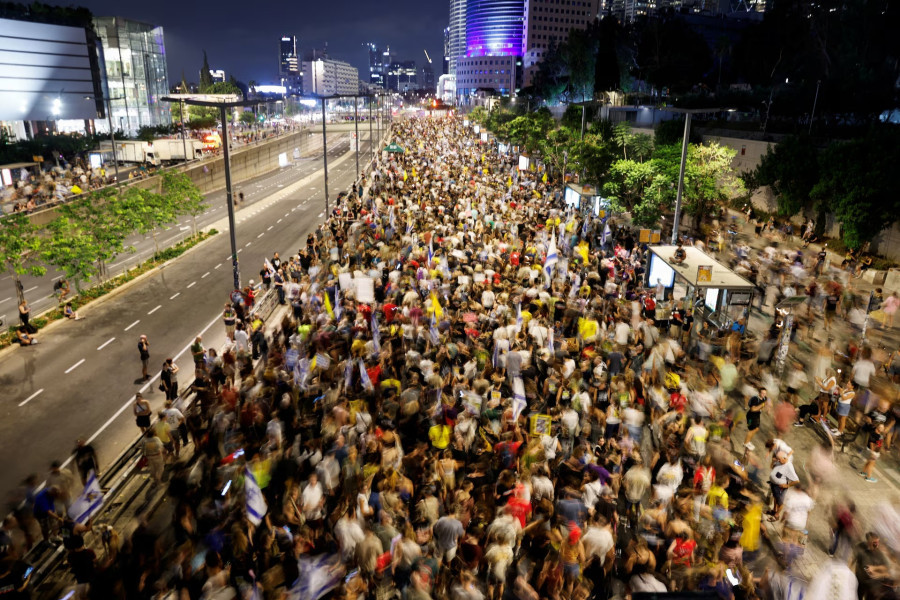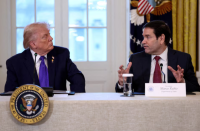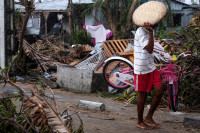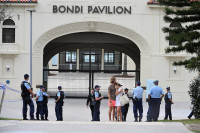National
Voices against Gaza offensive grow louder in Israel
Protests have intensified after Netanyahu decided to take over Gaza.
Binod Ghimire
While Israeli authorities defend their attacks on the Gaza Strip as necessary to protect the country, dissent within Israel is growing louder against the bloodshed, arguing it is triggered by intense animosity towards Palestinians.
Ever since the Hamas terrorist attack in Israel on October 7, 2023, taking the lives of 1,200 people, Israeli security forces have been relentlessly bombarding Gaza, not just killing the terrorists but also taking innocent lives.
Different reports put the total death toll at 61,000 as of last week, with close to a third being children. Scores of lives have been lost due to starvation as Israeli authorities frequently obstruct the distribution of humanitarian aid to Gaza, home to two million people.
Ignoring strong domestic and global calls to stop the war, Netanyahu's government on Friday decided to take complete control of Gaza, which it claims is to disarm Hamas, return all hostages, demilitarise the area, take security control of the territory, and establish an alternative civil administration.
“This is the worst decision that could have been taken,” Daniel Shek, head of the Diplomacy, Hostages and Missing Families Forum in Israel, told the Post. (This scribe was part of a delegation of Nepali journalists taken to Israel to see the ground reality by the Embassy of Israel in Kathmandu.) “The military action has done what it can do. You cannot release the hostages without ending the war, but the government is not willing to do so.”
For months, the families of missing and hostages had been taking to the streets of Jerusalem and Tel Aviv demanding an end to the war. Agitations have intensified after the Netanyahu government decided to complete a military takeover of the strip.
An Israeli journalist who has long followed the development says the decision portrays the radical nature of the present government. “We have ministers who don’t believe in the rights of Palestinians to exist,” Ali Wakad, manager at i24NEWS, an international news channel based in Tel Aviv, told a group of Nepali journalists on Friday.
Netanyahu, who leads The Likud, a conservative nationalist party, has formed the government with the Religious Zionist Party and Jewish Power Party, which are vocal against Palestinians.
With another coalition partner, the United Torah Judaism Party, quitting the government last month, Netanyahu is under pressure from the two radical parties to act as they want, as per media reports.
Bezalel Smotrich, chief of the Religious Zionism Party, is a finance minister, while Itamar Ben-Gvir, of the Jewish Power Party, is a security minister. Withdrawal of either of the two would mean the fall of the present government.
As per a report by The Guardian, Smotrich believes Jews have a ‘divine right’ to all land that made up biblical Israel (which includes Palestine) and Ben-Gvir, for years, lived in a house decorated with a portrait of Baruch Goldstein, who gunned down 29 Palestinians in a Hebron mosque in 1994.
“The extension of war means putting more lives on both sides, including those of the hostages, at stake,” said Shek, who is Israeli former ambassador to France. Among 253 taken hostage by Hamas, 50 remain held in Gaza.
Of them, 20 are alive as per the Israeli Ministry of Foreign Affairs. The ministry, however, says it has no clear information on some others, including Nepali youth Bipin Joshi, who was taken captive while he was in Kibbutz Alumim under an ‘earn and learn’ programme.
Talking to the Nepali journalists, Sagi Karni, head of bureau for South East Asia, Israeli Ministry of Foreign Affairs, said last week that Israel never initiates any war but always acts in self-defense. “Every step being taken is to ensure the safety of the Israeli people, which is our top priority,” he said.
While asserting that only releasing hostages is not enough to stop the attacks, he further said, “War against terrorism will continue so long as there are terrorists. It is not only Hamas, but there are terrorist organisations in Lebanon, Syria, Iran and others. Peace cannot prevail so long as there are ‘Islamofascist’ organisations.”
However, the world, including a large section of Israel, is protesting against the Israeli government’s months-long attacks killing tens of thousands in the name of eliminating Hamas. Protests with placards written “Palestinian Lives Matter” have become common sights even in Jerusalem and Tel Aviv, not to mention other parts of the world.
Only Sunday, five Al Jazeera staff in Gaza, including prominent journalist Anas al-Sharif, were killed in a ‘targeted’ drone attack. The act has received widespread criticism, as it has been termed an attempt to block the ‘ears and eyes of the world to Gaza’.
During interactions with the journalists, Israeli officials blamed Palestinian authorities and even common people for the present mess saying they “cannot be trusted.” One official even went on to claim that Palestinians workers in different Kibbutz in Israel would take the videos of the places and people and secretly pass them to Hamas helping Hamas plan the October 2023 attack. However, locals from two Kibbutzs where dozens of people were killed and abducted told the Post that no Palestinians worked in those places before the attacks.
“Viewing Hamas, Palestinian Authority Security Forces and Palestinian people with the same lens is problematic,” said Shek. “Hamas has a heavy responsibility for what is happening today. However, talks and only talks are the solution to the crisis.”
Many Israelis fear the territorial and political conflict between the two movements (Israeli and Palestinian) could turn into religious conflict, which in turn could quickly spread to other parts of the world.
“Let it be clear, the Israelis are going to be here and so are the Palestinians. The radicalisation on both sides must stop,” said Wakad, the manager at i24NEWS. “Only a joint effort of Israeli and Palestinian society and backed by the international community can end conflict. And that is possible when we strongly believe in coexistence… all the people can live together in this holy land.”




 21.12°C Kathmandu
21.12°C Kathmandu














